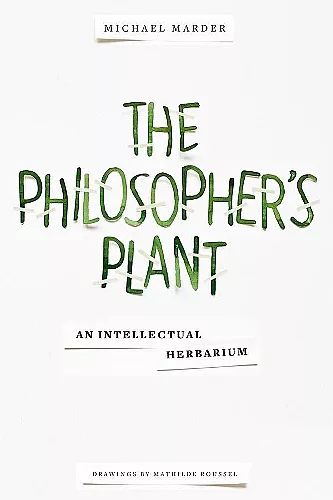The Philosopher's Plant
An Intellectual Herbarium
Michael Marder author Mathilde Roussel illustrator
Format:Hardback
Publisher:Columbia University Press
Published:28th Nov '14
Currently unavailable, and unfortunately no date known when it will be back

A secret history of philosophy grafting theory onto science, combining art and storytelling to bring Western thought back to its roots
Despite their conceptual allergy to vegetal life, philosophers have used germination, growth, blossoming, fruition, reproduction, and decay as illustrations of abstract concepts; mentioned plants in passing as the natural backdrops for dialogues, letters, and other compositions; spun elaborate allegories out of flowers, trees, and even grass; and recommended appropriate medicinal, dietary, and aesthetic approaches to select species of plants. In this book, Michael Marder illuminates the vegetal centerpieces and hidden kernels that have powered theoretical discourse for centuries. Choosing twelve botanical specimens that correspond to twelve significant philosophers, he recasts the development of philosophy through the evolution of human and plant relations. A philosophical history for the postmetaphysical age, The Philosopher's Plant reclaims the organic heritage of human thought. With the help of vegetal images, examples, and metaphors, the book clears a path through philosophy's tangled roots and dense undergrowth, opening up the discipline to all readers.
From the conversation of Socrates and Phaedrus in the shade of the plane tree to Irigaray's meditation on the water lily, The Philosopher's Plant takes us outside city walls, across gardens of letters and vegetables, grassy slopes and vineyards, to the dimly lit sources of philosophy's vitality. With distinctive depth and clarity, Marder reminds us that, far from walled in, the human community communes with nature and is itself inhabited by nature. -- Claudia Baracchi, Universita degli Studi di Milano-Bicocca The Philosopher's Plant is an original contribution to a concept which for too long has been marginalized. As the only contemporary philosopher working on plants from a deconstructive and weak-thought perspective, Marder provides not only another contribution to the philosophical concept of plants in general, but also adds onto his own work. -- Santiago Zabala, ICREA/University of Barcelona The Philosopher's Plant is a genuine pleasure to read and one of the most innovative books I have encountered in some time. Marder's argument is that contemporary scientific research into how plants communicate, interact with, and possibly even perceive the environment should be enriched by an engagement with how the Western philosophical tradition has already thought and continues thinking the problem of plant life for human being-in-the-world. -- William Egginton, Johns Hopkins University The Philosopher's Plant is an alluring immersion in phytophilia, exploring the thought of philosophers from Plato to Irigaray by way of their intimate reflections on plant life. Not only do we learn much that is subtle and profound about plants but we come to see the work of these thinkers in refreshing new lights. Humor and wit alternate with penetrating philosophical insight in this bouquet of delights. -- Edward S. Casey, SUNY at Stony Brook, author of The World at a Glance and The World on Edge One must give Michael Marder credit for combining the deconstruction of our traditional metaphysics with a focus on the plant world. He invites us to perceive and consider again the presence and the potential of our living environment, the thoughtless use of which has damaged both our life and our culture. -- Luce Irigaray All who get a taste of this succulent study will find much food for thought. Library Journal (starred review) [The Philosopher's Plant] provides provocative insight into the significance of plant life in the evolution of philosophical thought... Recommended. Choice
ISBN: 9780231169028
Dimensions: unknown
Weight: unknown
288 pages